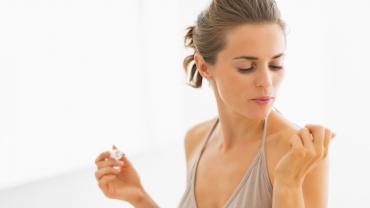
In part 1 of this look at biotin (vitamin B7) we covered this nutrient’s role as a cofactor for carboxylase enzymes involved in fatty acid synthesis gluconeogenesis and the metabolism of branched chain amino acids. We also looked at its role in the elongase enzymes that convert omega-6 linoleic acid and omega-3 alpha-linoleic acid (ALA) into longer-chain fatty acids such as EPA and DHA (from ALA).
Aside from those biochemical pathways what most people—medical professionals and laypeople alike—know biotin for is hair and nails. Even though overt biotin deficiency may result in hair loss there isn’t much evidence supporting a role for high-dose biotin in reversing alopecia except perhaps in cases of frank biotin insufficiency.
So what about nails? If good quality protein and extra collagen fail to strengthen nails and help them grow it’s possible biotin could come to the rescue.
A study from Switzerland revealed that among a small number of women who had been prescribed daily biotin supplementation for brittle nails 63% showed clinical improvement but 37% did not. Again perhaps biotin deficiency was not to blame in all cases so supplementing may not have been effective. (Among the women who did see benefit nail plate thickness increased by 25%.) A German study found that daily supplementation with 2.5 mg of biotin for 5.5 months (+/- 2.3 months) resulted in firmer and harder finger nails in 91% of subjects with “questionable” improvement in the remaining 9%. None of the subjects considered the treatment to be completely ineffective though which speaks well of the role of this vitamin for nail strength. Another study supporting the efficacy of biotin for improving weak brittle nails showed that biotin supplementation increased nail thickness by 25% (assessed by scanning electron microscope) reduced nail splitting and reduced irregular cellular arrangement of the nail surface.
Good sources of biotin include liver egg yolks yeast oats mushrooms whole grain wheat and soybeans. (Y’know if you’re into wheat and soybeans…). In order to have a significant effect on nails however biotin is likely required in a dose above that which is typically obtained from food.
Another potential source of biotin is colonic bacterial synthesis. Humans do absorb some of this biotin (via the sodium-dependent multivitamin transporter) but it’s not known for certain whether we do so in clinically meaningful amounts. It seems that biotin of intestinal bacterial origin contributes at least somewhat to serum levels though because according to one study 11% of women who were overtly biotin deficient had gastrointestinal disorders or were on medications that interfere with intestinal biotin synthesis and/or absorption. Drugs that may deplete biotin or inhibit its absorption include anticonvulsants sulfonamide (sulfa) drugs and antibiotics.
How best to assess biotin status then? This can be accomplished via serum levels or measuring urinary organic acid secretion. For serum biotin levels below 200 ng/L indicate frank deficiency. Daily fluctuations of up to 100% are normal so for practical purposes one study’s authors classified levels below 100 ng/L as being deficient between 200–400 ng/L as suboptimal and greater than 400 ng/L as optimal. Organic acid testing may be more reliable than serum measurements. The most reliable detection method for biotin deficiency is elevated urinary excretion of 3-hydroxyisovaleric acid in the urine (>195 μmol/24 h).
Severe biotin deficiency is very rare and is usually the result of inborn errors of biotin metabolism. Signs of overt biotin deficiency include hair loss (alopecia) and a scaly red rash around the eyes nose mouth and genital area. Symptoms in adults may manifest as depression lethargy and neurologic symptoms such as numbness and tingling of the extremities ataxia and seizures. The facial rash along with an unusual distribution of fat around the face has been called the “biotin deficient face” by some researchers.
For individuals looking to strengthen their hair and nails biotin may help but adequate protein intake is also key. And in case anyone with weak nails or brittle hair is in the habit of glugging down Rocky-style protein shakes raw egg whites contain avidin a compound that interferes with absorption of biotin. So keep enjoying eggs as a great source of protein but be sure to cook them.